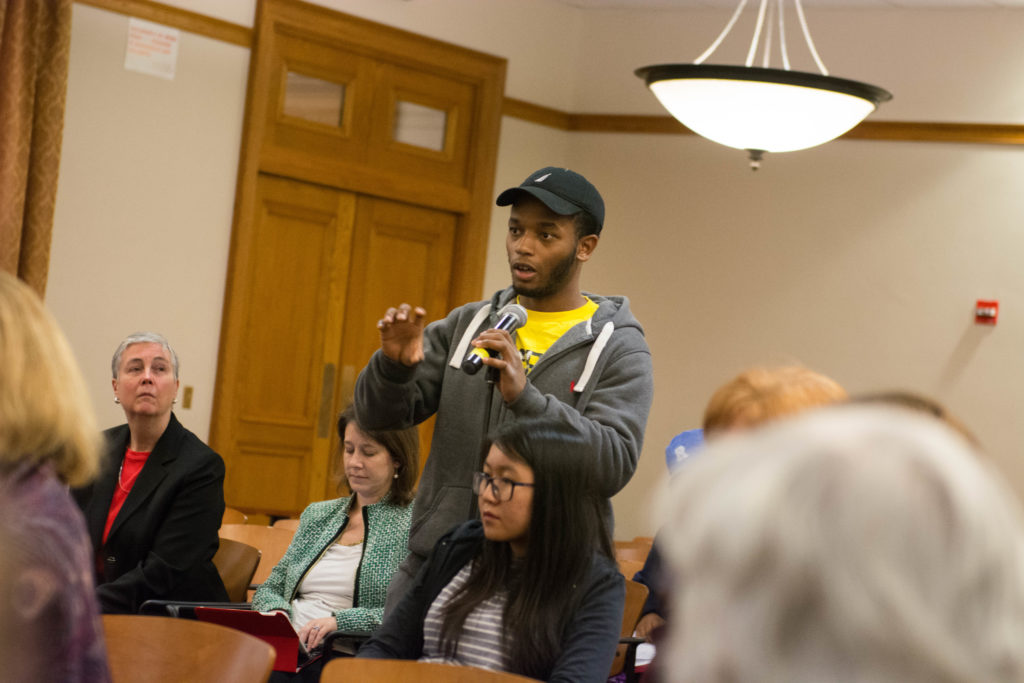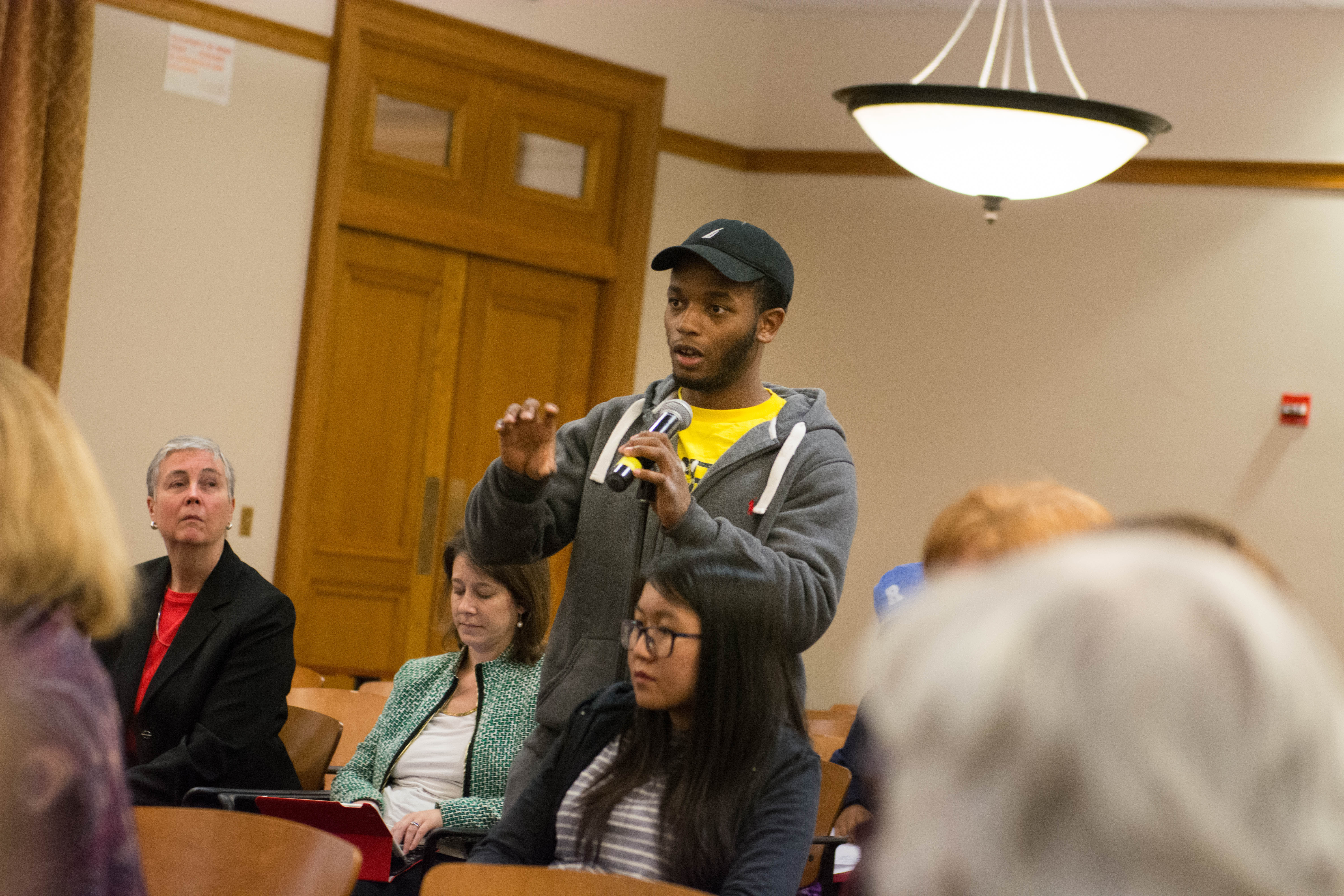University President Joel Seligman accepted the main recommendations of his Commission on Race and Diversity last Tuesday, including those to give the Office of Minority Students Affairs (OMSA) a new space, create a $25,000 diversity fund, and form a Presidential Diversity Council.
In an email to the University community, Seligman announced that he would be accepting the “principal recommendations” of the Commission, “specifically including its basic recommendations on Leadership, Students, Faculty, Staff, and Climate and Community.”
“Taking affirmative steps to enhance a welcoming and inclusive campus is consistent with our core values, an objective of the University that has become an enduring part of our campus culture,” he wrote. “At the University of Rochester we are committed to supporting all of our students, faculty, staff, patients, and visitors and making all feel part of our community and respected.”
The accepted recommendations stem from the Commission’s 32-page final report (153 pages, with appendices), released in late October. Other, more-detailed recommendations from the report were not accepted by Seligman, pending further review.
Race and diversity have been at the fore of campus discussion for years, largely in response to racist posts on Yik Yak, a peaceful protest featuring a list of demands by minority students (prompting the creation of the Commission), and the recent decision to arm select officers from the Department of Public Safety.
So, for many students, faculty, and staff, the acceptance of the recommendations is a limited but hopeful sign of progress.
More work ahead
In a statement on behalf of the Minority Student Advisory Board (MSAB), President Delvin Moody praised much of the previous work of the Commission, saying that the accomplishments “speak to the collective power we share when we are united and stand together.”
“For the better part of a year, this commission has been working to address the concerns and demands we laid before them in the spring semester of 2016,” the junior wrote. “As [MSAB] president, I want to say that we are thankful and acknowledge the work of the commission thus far to ensure that the University of Rochester is for all students.”
Past projects of the Commission include the launch of the “We’re Better than THAT” anti-racism campaign, the publicization of a bias-related incident reporting system, and a $25,000 One Community Programming fund, which has already been used to fund several campus events.
But Moody noted that this did not mean the process was over, or even that MSAB agreed with all of the accepted recommendations. He raised specific disagreements with the $25,000 university-wide diversity fund and the membership of the Presidential Diversity Council (PDC).
“The [diversity] fund was requested to be a student fund administered partly by MSAB and OMSA, in the same manner that funds are allocated to Hall Councils at the University and the Appropriations Committee within Student Government,” he said in the statement. “We are fearful that having a fund not administered partly by MSAB will cause funds to be distributed to programming that (1) could be funded through other means like communal principles grant, (2) limit the resources afford to historical underrepresented minorities on campus.”
On the composition of the PDC, Moody wrote that MSAB is “concerned that a council of ‘senior leadership’ does not fully represent the voice of the entire university. We know that it was not ‘senior leadership’ that acknowledged nor catalyzed increased support and resources to minority students. Therefore, we are concerned about the outcome that a council solely comprised of university senior leadership will have.”
Students’ Association (SA) President and senior Vito Martino called the acceptance of the recommendations a “good start,” but agreed that the effort is ongoing.
“The subject of race and diversity on our campus won’t change overnight, but it has to be constantly addressed if we want sustainable change,” he said in an email to the Campus Times. “What this means going forward is that as students we cannot allow the momentum gained over the past year to dwindle.”
Seligman, too, acknowledged in his community-wide email that UR still has “much work to do.”
Further discussion pending
Part of that work, Seligman indicated, will include determining which of the Commission’s recommendations are feasible, not just figuring out new ideas to incorporate into UR’s race and diversity plan.
Seligman said in an email to the Campus Times that only the broad, principle recommendations were accepted across the board.
Specifically, he said the detailed sub-recommendations under each main recommendation—the blue, un-bulleted text in the final report—contain “a great deal of detail” and that he would “want to study this with the Presidential Diversity Council and confirm that the detail is fully actionable.”
Seligman did, however, accept a few of the detailed parts of the broader principle recommendations—with a few revisions, noted in the email to the community. These include the diversity fund and the proposed PDC membership.
A space of its own
At a recent town hall meeting on the Commission’s final report, discontent about a lack of space for OMSA brewed, becoming the signature issue of the evening.
The report said additional space was “not currently available,” but that the search would continue. There was not, however, a formal recommendation by the Commission to do so.
Despite that, OMSA and the students it serves’ desire for more space may yet be satisfied—the Office’s space will be “expanded over the next few months,” according to Seligman. He wrote that the College of Arts & Sciences and the Simon School of Business are “already working on a plan.”
Claudia De Leon, an academic program coordinator for OMSA, said she was enthusiastic about the expansion, “as it will mean that students will have a temporary solution to one of their concerns regarding an essential safe space on campus.”
Still, De Leon said, this is only one part of a larger undertaking.
“As President Seligman stated, there is much work to be done, and this includes, in my opinion, additional dedicated resources to students, faculty and staff who consistently experience racial issues,” she wrote in an email. “Including those directly affected in the decision-making processes is crucial for a better university and climate for marginalized groups.”
Commission to Council
Though the Commission on Race and Diversity will be dissolved, its role will live on through the newly-created PDC.
Members of the PDC and its subcommittee, focused on policy implementation, will include representatives from all of the University’s schools—from dean-level administrators to students—as well as a few more officers whom Seligman proposed.
Student representatives from MSAB, the Graduate Students of Color Council, and SA Government will have reserved spots on the implementation subcommittee, per the recommendations of the final report, but not the PDC itself.
Dean of the College Richard Feldman and University Dean Paul Burgett, who co-chaired the Commission together, will retain voices on diversity initiatives as a member of and an advisor to the Council, respectively.
Seligman wrote in his email that the PDC will be a permanent fixture at UR, and will hold monthly meetings starting in the spring semester—possibly as soon as December.
A suite of reforms
Other recommendations are numerous, and although many of them will be subject to future discussion by the PDC, a few are imminent.
The $25,000 diversity fund will soon become available, administered by Provost Robert Clark. Details have not yet been worked out, but would be discussed at the first meeting of the PDC, according to Melinda Smith, executive assistant to the provost.
The Frederick Douglass Building will be renamed “Frederick Douglas Commons,” and will, with Wilson Commons, be referred to as the “Campus Center.”
And the possible naming of Martin Luther King Jr. Day as a University holiday—the Commission’s final recommendation—is also slated for discussion during the Council’s initial meeting.
Among the yet unaccepted recommendations, pending PDC review, were school-by-school provisions for implicit bias and cultural insensitivity education for students, faculty, and staff, and data-driven analysis of the “academic and social climate” for the purpose of understanding students’ lived experiences and perceptions at the University.
Also included: yearly faculty, staff, and student diversity reports to the PDC, and recommendations for more transparent faculty hiring practices and stronger efforts for attracting diverse applicant pools.
Seligman wrote in the community-wide email that he had received 42 written comments in response to the Commission’s final report—and several more verbal suggestions at a series of three town hall meetings on the subject—the unaddressed issues in which would also be considered by the PDC at future meetings.



